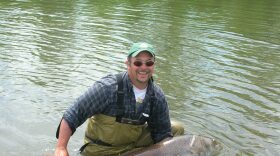-
With the rise of plastics, there’s been an uptick in substitute wood products.The shift has environmental and economic effects.
-
For a long time, bats have gotten a bad rap.They’re featured in scary movies, thought to always be carrying a disease like rabies, and can be seen as pests.A local naturalist is hopeful changing perceptions will to better conservation of the species.
-
Wisconsinites tend to take pride in being the dairy state, encouraging the love of everything from cheese curds to custard to cream puffs.But are you aware of how much research goes into perfecting the products?
-
Democracy thrives when people are engaged with each other and their communities.
-
When you think of all the species of wildlife that call the Northwoods home, deer mice probably aren’t what first comes to mind.But a local researcher says they’re essential.
-
Holloway will be talking about how science supports air quality management and how wildfire smoke is changing that at May’s Science on Tap Minocqua.
-
Wisconsin’s Green Fire is an organization dedicated to science-based management of the state’s natural resources.Its beginning eight years ago has ties to the Northwoods.
-
Wisconsin saw an increase in reports of algal blooms on lakes in 2024.But just because reports are up, doesn’t mean lakes are experiencing more or worse blooms.
-
PFAS is a group of manmade chemicals that are being found more and more in our environment.They’ve also been found in people and linked to number of health risks including increased risk for some cancers.
-
Dozens of species of fish thrive in the cold waters of Lake Superior.It’s the last remaining Great Lake where native species haven’t been out populated by invasive ones.

Play Live Radio
Next Up:
0:00
0:00
Available On Air Stations










